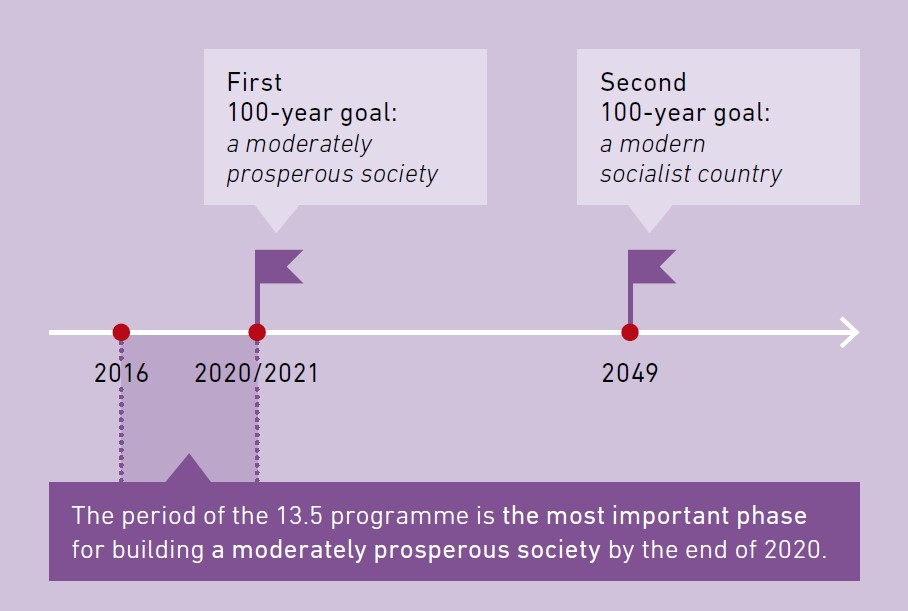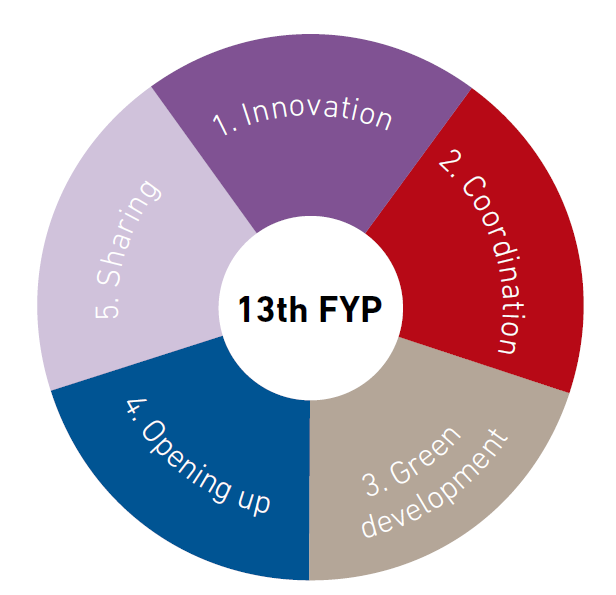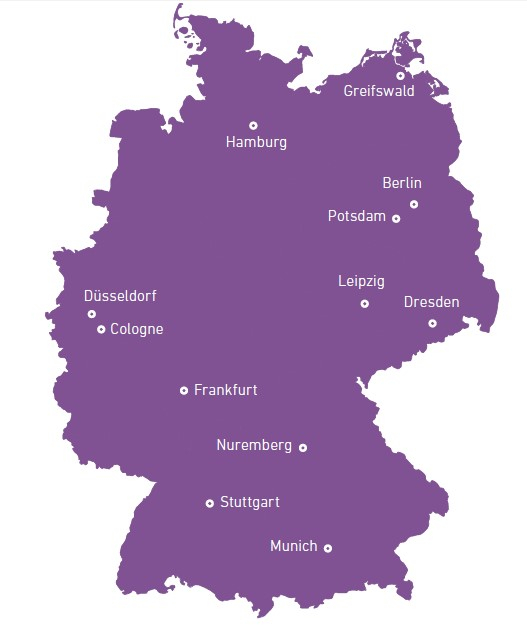
The Future Development of China by Mazars Germany China Desk
Background of the 13th Five-Year Plan
According to China’s National People’s Congress statement, China should develop a moderately prosperous society and modern socialist country. The first 100-year goal should be achieved by the 100th birthday of the Chinese Communist Party in 2021, and the second 100-year goal should be achieved by the 100th birthday of the People's Republic of China in 2049. A modern socialist country should be developed that can be described as prosperous, democratic, culturally advanced and harmonious.
The principles of the 13th Five-Year Plan
What are the principles and aims in the 13.5 proposal?
Great improvements should be made in all industries. The Chinese economy should grow at a medium or high rate, more than 6.5% on average. The GDP and average income of urban and rural residents by 2020 should be twice that of 2010. Consumption is seen as more important for economic development, regional poverty should be resolved, and general improvements in social and environmental conditions should be achieved. Based on achievements and difficulties encountered during the last FYP (12.5 /2011-2015), the 13.5 plan with its five guiding principles was developed.
The plan includes various measures and promising aims not only for China but for the whole world. The plan firmly sticks to the concept of development which is: Innovation, Coordination, Green development, Opening up and Sharing.
This is a profound revolution in the overall situation of China's development.
The first 100-year goal of a moderately prosperous society is defined through the comprehensive development of a civilization's economy, political structure, culture, society and ecology.
The 10 aims of such a society are:
- By 2020,the per capita GDP is more than 3,000 USD.
- Average disposable income of urban and suburban residents is 18,000 RMB.
- Average net income of rural residents is 8,000 RMB.
- Reduction of the Engel coefficient to lower than 40%.
- A 30 square metre per capita housing area for urban and suburban residents.
- Urbanization growth level is higher than 50%.
- Penetration rate of personal computer is 20%.
- University and college enrolment rate is 20%.
- 2.8 doctors per 1000 inhabitants.
- Rate of subsistence allowance in urban and suburban areas is above 95%.
Principle Innovation
Chinese consumption style should be “intelligent, green, healthy and safe”. Financial regulations and the fiscal system should be reformed and improved. The investment system must be optimized. 13.5 suggests introducing outstanding investment programmes into China and supporting promising Chinese investments aboard. Manufacturing developments will be accelerated by implementing “Made in China 2025”.
The “Internet Plus” strategy and Big Data revolution will be implemented to promote technology of ‘Internet of Things’ and applications. “Internet Plus” can be understood as a deep integration of “Internet + every traditional industry” based on information and communication technology.
Principle Coordination
3.5 fosters the balanced development of China in respect of regions and cities, and economic and social development. Support of less developed regions and cities should result in well-balanced growth. Coastal cities which are better developed should shift industrial capacities to Western regions, and improved infrastructure should help underdeveloped. The period of the 13.5 programme is the most important phase regions to prosper.
Principle Green Development
China's aim is to develop a resource-saving and environment-friendly society. This includes the saving of resources and protection of the environment. The Chinese economy is going green and will control carbon emissions strictly. The allocation systems of energy, water, drainage and carbon emissions is set to be improved. Electric vehicles will be promoted and energy-saving construction standards (e.g. green buildings) will be stricter.
Principle Opening up
China is firmly committed to the win-win strategy of opening up and the strategy of "One Belt One Road".
Principle Sharing
China will be developed by the people and the achievement will be shared among the people. Public services will be better shared, poverty programmes targeted for improvement, education will be developed equanimously, structural problems of employment moderated, social insurance, basic pension systems and medical insurance improved using different methods, medical treatment and public health systems reformed and food safety standards implemented. "Family Planning" will still be adhered to. “Family Planning” includes encouraging late marriages and childbirth, as well as a lower mortality birth-rate. In addition, the on-going anti-corruption campaigns will contribute to the successful realisation of the proposed 13.5 plan.
About Mazars in Germany
RBS-Mazars has 12 offices in Germany and over 1,000 employees. The annual income is over 110 million Euros. It is the top ten accounting firm in Germany.




